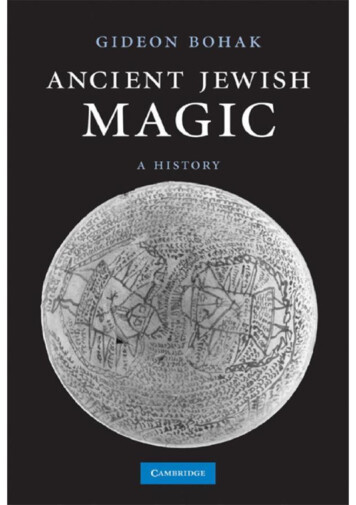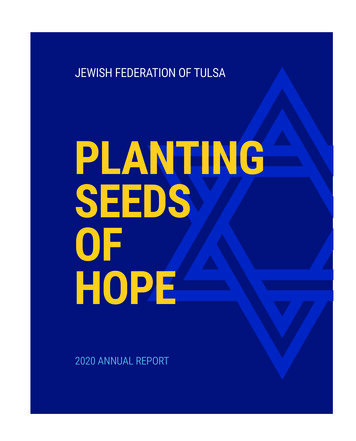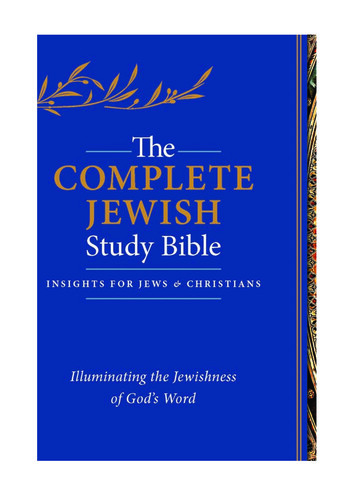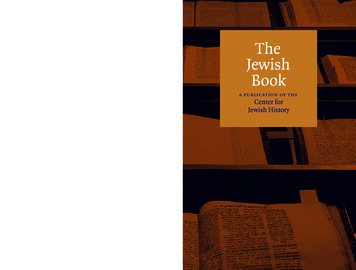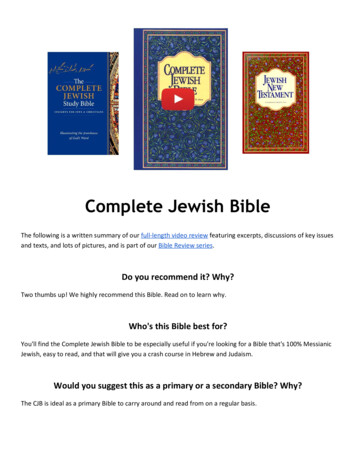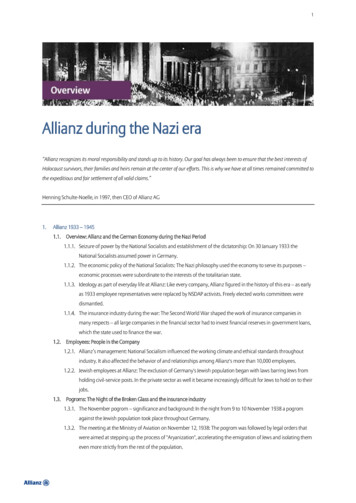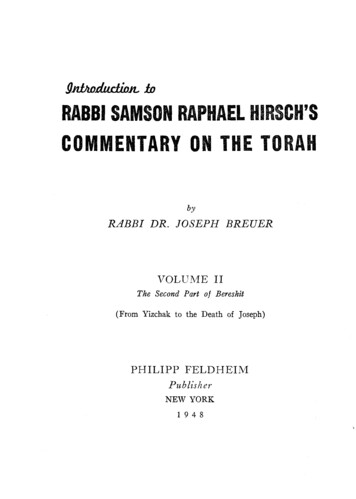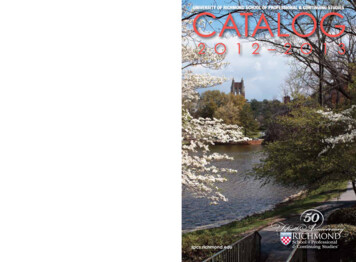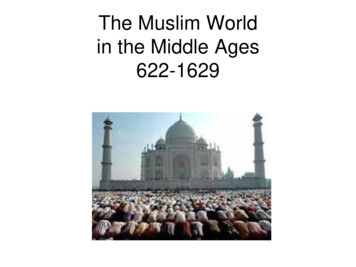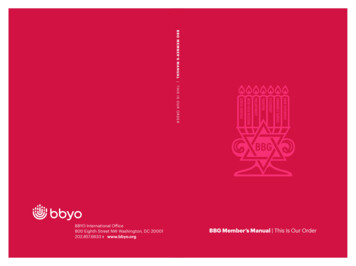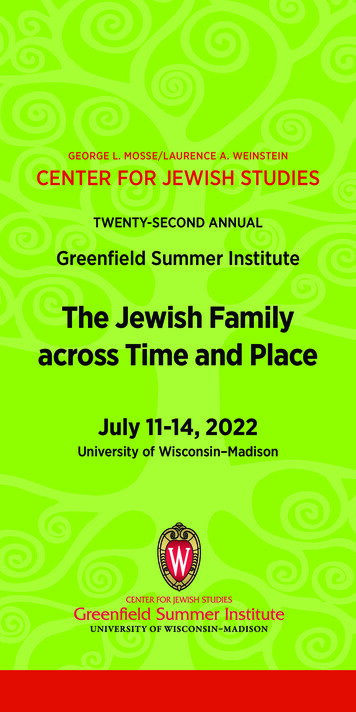
Transcription
GEORGE L. MOSSE/LAURENCE A. WEINSTEINCENTER FOR JEWISH STUDIESTWENTY-SECOND ANNUALGreenfield Summer InstituteThe Jewish Familyacross Time and PlaceJuly 11-14, 2022University of Wisconsin–Madison
What does Jewish law say about the obligations ofparents, children, husbands, and wives? How doJewish rituals help maintain families? How havekinship bonds evolved from the Hebrew Bible tothe present? Join us at the 2022 Greenfield SummerInstitute as historians, social scientists, and scholarsof religion gather to explore the changing natureof Jewish families and their interactions with thelarger societies they inhabit. Speakers will discusssuch wide-ranging subjects as race and diversity inthe family context; dating, marriage, and sex in theOrthodox world; the portrayal of Jewish familiesin film and television; and one extended Jewishfamily’s role in defeating Nazi forces in North Africaduring World War II. With topics ranging from theIsraelite cult of dead kin to the “myth” of the Jewishwedding, this year’s Greenfield will offer a richerunderstanding of the phrase le-Dor va-Dor—fromgeneration to generation.Space is limited, so please register early.Can’t make it for the whole Institute? You canregister for each day’s lectures and events separately!Online registration: cjs.wisc.edu/greenfieldThe Greenfield Summer Institute is sponsored by theMosse/Weinstein Center for Jewish Studies through thegenerosity of Larry and Roslyn Greenfield.All lectures will be held at Grainger Hall,975 University Avenue.2 jewishstudies.wisc.edu/greenfield
MONDAY, JULY 118:00 a.m.Coffee Service and Registration9:00 a.m.Opening BreakfastSit-down breakfast and opening remarks by CJS DirectorTony Michels10:30 a.m.Life and Death in the Israelite HouseholdKerry Sonia (Colby College)The cult of dead kin in the ancient Near East was a complexof practices in which the living offered care to the deadin the form of food and drink offerings, commemorativemonuments, invocation of the names of the dead, and theprotection and, when necessary, repatriation of humanremains. This cultic care negotiated the ongoing relationshipsbetween the living and the dead and, in doing so, helpedstructure social, political, and topographical landscapes interms of the past. This talk examines the nature of the Israelitecult of dead kin, focusing on its role within the family and itsrelationship to the Jerusalem temple cult.1:30 p.m.Looking Below the Numbers: Race, Color,and Jewish DiversityBruce Haynes (University of California, Davis)Based on sociological research on the lived experiences ofJews of African descent and their families in America, thistalk asks the foundational question: What makes a Jew?Blending historical analysis and oral history, this presentationtraces the history of Jews of African descent in America andthe counter-narratives they have put forward as they staketheir claims to Jewishness. What’s the meaning of color inJewish families? This lecture challenges the dominant westernparadigm of Jews as of Ashkenazi descent.608-890-3572 I greenfield@cjs.wisc.edu 3
3:15 p.m.‘To Jewish Daughters:’ Yiddish Cookbooks and RecipesAnnie Polland (Tenement Museum)In 1901 the first Yiddish cookbook written by a woman hitthe bookstores and pushcarts of the Lower East Side. Theauthor, former restaurateur Hinde Amhanitski, promised“Jewish daughters” that her book would be economical andwould enrich their family lives. Mysteriously, a subsequent“improved” edition came out in 1918, also bearingAmhanitski’s name. Yet she had died in 1910. Join us as wecompare the two versions, gaining insight on the expectationsof Jewish mothers and how they changed over time.TUESDAY, JULY 128:00 a.m.Continental Breakfast and Registration9:00 a.m.The/Jewish FamiliesJonathan Boyarin (Cornell University)From Abraham and Sarah to Bridget and Bernie, Jews andothers all love to talk about the Jewish family. But what, ifanything, really links notions and formations of “family” sovastly separated in time and space? Perhaps the key factorhere is the underlying sense that Jews are some kind offamily—with adoptees, favorite children, black sheep andall. This talk will explore why it makes sense both to thinkthat there is something called “the Jewish family,” and tounderstand why Jewish families are and should be just asvaried as everybody else’s.10:45 a.m.We are Family: The Imagined Ancestries ofBlacks, Jews, and Others on TVShaina Hammerman (Stanford University)On an episode of the 1990s sitcom The Nanny, the characterFran Fine comes to believe her biological mother is Black. In4 jewishstudies.wisc.edu/greenfield
Sanford & Son, the Black junk dealer Fred Sanford comes tobelieve he is descended from African Jewish royalty. In bothcases, language and behavior change following the newlyimagined lineage. The episodes conclude with—spoiler alert—the characters learning that they were wrong and returningto their respective, predetermined places. But whether trueor fantastical, what does it mean for Black and/or Jewishperformers to “adopt” new lineages?1:30 p.m.Dear Editor: Finding Family throughthe American Yiddish PressAyelet Brinn (Hadassah-Brandeis Institute)At the turn of the twentieth century, American Yiddishnewspapers overflowed with advice columns offeringimplicit and explicit guidance to help readers navigatepersonal tribulations, American political infrastructures, orJewish communal life. Editors and publishers introducedthese features to entertain readers and increase circulation.But these features also encouraged audiences previouslyunaccustomed to reading newspapers to view thesepublications as central sources for information and guidance.This talk will explore the crucial role of advice columns in thedevelopment of the Yiddish press and American Jewish life.It will highlight how these columns shaped the relationshipsbetween newspapers and their readers and the roles theyserved in helping readers connect with family through thepages of the Yiddish press.3:15 p.m.Family Obligations in Rabbinic LiteratureJordan Rosenblum (University of Wisconsin-Madison)In rabbinic literature, being a member of a family is not justabout being related; it is also about being obligated to oneanother in many ways. From the profound (e.g., mourningrituals) to the mundane (e.g., a parent teaching a child toswim), these relationships are defined through a series of legalobligations. In this talk, we will explore rabbinic texts thatdiscuss what being a member of a family requires of variousfamily members. Taken together, these traditions help us608-890-3572 I greenfield@cjs.wisc.edu 5
understand how rabbinic texts imagine family members tobe connected through a series of social, economic, and ritualobligations.WEDNESDAY, JULY 138:00 a.m.Continental Breakfast and Registration9:00 a.m.Be Fruitful and Multiply: Dating, Marriage, and Sex in theOrthodox and Ultra-Orthodox WorldJoshua Shanes (College of Charleston)Orthodox Jews have become a hot topic in popular culture,and sex, gender, and marriage practices seem to be front andcenter in these stories. From Shtisel, to Unorthodox, to the hitreality series My Unorthodox Life, Orthodox dating practices areexoticized, fetishized, and at times condemned. How realisticare these portrayals? How do Orthodox Jews date and marry,and what are the differences between the various communities?This lecture will go beyond the popular dramatization andexplore the true story of Orthodox sex and marriage.10:45 a.m.Jewish Birth TraditionsCara Rock-Singer (University of Wisconsin-Madison)Scholars and practitioners alike often take for grantedthat Judaism is a text-centered tradition maintained byauthoritative rabbis. Yet ethnographic research in the UnitedStates and Israel reveals another set of elites: midwives whodon’t attend yeshivas or seminaries, but attain knowledge andexperience by helping women give birth. This presentationwill show how birth attendants have developed Jewishtraditions over which they claim authority as interpreters,teachers, and reformers. These traditions emerge fromboth Jewish law and culture as well as American feministmovements. This lecture will reveal a range of women’straditions that are central to reproducing the Jewish family buthave often gone unrecognized.6 jewishstudies.wisc.edu/greenfield
1:30 p.m.Myths of the Jewish WeddingVanessa Ochs (University of Virginia)Many believe that the Jewish wedding traditions we arefamiliar with are ancient, going back to the Bible. Not so! Thevery practices considered quintessentially Jewish—huppa, thebroken glass, wedding rings, the illuminated ketubah—wereall inspired by the national and religious cultures Jews lived in.Knowing that Jewish wedding traditions have been changingand adapting all along helps us better reflect upon innovationsin current Jewish and Jewish/interfaith weddings.3:15 p.m.Fifty Ways to Leave an Heirloom:Jewish American Families and CraftingJodi Eichler-Levine (Lehigh University)Challah covers. Prayer shawls. Yarmulkes. These are just a fewof the handcrafted objects that we find among Jewish families.For over three years, Eichler-Levine interviewed Jewishcrafters and artists in their homes, at stitching conventions,and at synagogue knitting circles. The stories of these JewishAmericans and their objects give us new ways to understandhow the phrase “l’dor v’dor” —from generation to generation—is enacted not just in words, but also in thread.5:30 p.m.Closing DinnerGrainger Hall975 University Avenue608-890-3572 I greenfield@cjs.wisc.edu 7
THURSDAY, JULY 148:00 a.m.Continental Breakfast and Registration9:00 a.m.The Origins of Israeli Cinema and Its New Jewish FamilyRachel Harris (University of Illinois at Urbana-Champaign)This lecture examines depictions of the family in Israeli film.Filmmakers from the 1940s and 1950s saw the family as anextension of the land and its fecundity: The heroic male wouldwork the land and be fruitful and women were rarely seenwithout children. Eventually, the family was reimagined andthe havura, a group of friends, came to replace the traditionalfamily unit. It was only with a turn towards representingimmigrants from North Africa and the Middle East thatdepictions of a more conventional family unit returned to thescreen. Often set in contrast to other units like the kibbutz orthe army, the family came to serve as a sign of traditionalism,affection, and conflict. In this talk we will consider thedevelopment of Israeli cinema through the lens of theevolving Israeli family.10:45 a.m.Persian Jewish Music from My Family TraditionGaleet Dardashti (Indiana University)We will explore the Judeo-Persian musical tradition throughboth recorded and live music examples. Dr. Galeet Dardashti’sgrandfather, Younes Dardashti, was one of the most famoussingers of Persian classical music. Galeet’s family history andher own artistic work are central to this session.12:00 p.m.Closing Lunch8 jewishstudies.wisc.edu/greenfield
REGISTRATION/PAYMENT INFORMATIONFeesThe fee for the Greenfield Summer Institute is 215 for allprogramming, including the opening sit-down breakfast,banquet dinner, and closing lunch. Registration received afterJune 27 will be subject to a fee increase. For information aboutprogramming please contact the Center for Jewish Studies byemail or phone (listed below).A la carte pricing 55 to attend lectures and activities on Monday, Tuesday, orWednesday 35 to attend lectures and activities on Thursday 30 to attend opening breakfast OR banquet dinner 20 to attend closing lunchRegistration OnlineRegistration information can be found online atcjs.wisc.edu/greenfield. Payment by credit card or checkis possible through the online registration form.Please note that you will still need to register online evenif you choose to pay by sending a check through the mail.Please be sure to register only once!Confirmation of your registration will be sent to you viaemail after your registration has been processed. If you havequestions about your registration status, please email us.Registration /payment informationcontinues on next page608-890-3572 I greenfield@cjs.wisc.edu 9
ParkingUnderground parking is available in Grainger Hall but shouldbe purchased ahead of time. Information about access toparking can be found on our website.LodgingThe Institute has blocked rooms at three nearby hotels: Graduate Madison ( 179) Park Hotel ( 169 dependent on room type) Hampton Inn & Suites ( 169)Reservations in these room blocks can be made over thephone or online. Please visit the Greenfield webpage for moreinformation on the amenities and locations of each hotel aswell as to find the phone numbers and online booking linksfor these hotels.Questions?You can reach us by phone or emailPhone: 608.890.3572Email: greenfield@cjs.wisc.edu
608-890-3572 I greenfield@cjs.wisc.edu 11
The Jewish Family across Time and PlaceTwenty-Second AnnualGreenfield Summer sc.eduUniversity of Wisconsin–MadisonCenter for Jewish Studies4223 Mosse Humanities Building455 N. Park StreetMadison, WI 53706
Orthodox and Ultra-Orthodox World Joshua Shanes (College of Charleston) Orthodox Jews have become a hot topic in popular culture, and sex, gender, and marriage practices seem to be front and center in these stories. From Shtisel, to Unorthodox, to the hit reality series My Unorthodox Life, Orthodox dating practices are

